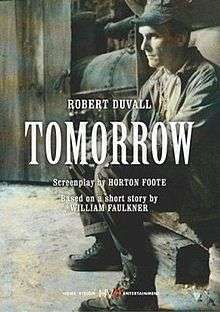Tomorrow (1972 film)
| Tomorrow | |
|---|---|
 | |
| Directed by | Joseph Anthony |
| Produced by |
Gilbert Pearlman Paul Roebling |
| Written by |
Story: William Faulkner Screenplay & Play: Horton Foote |
| Starring |
Robert Duvall Olga Bellin |
| Music by | Irwin Stahl |
| Cinematography | Allan Green |
| Edited by | Reva Schlesinger |
| Distributed by | Filmgroup Productions |
Release dates | 9 April 1972 (USA) |
Running time | 103 minutes |
| Country | United States |
| Language | English |
Tomorrow is a 1972 film directed by Joseph Anthony. The screenplay was written by Horton Foote, adapted from a play he wrote that was based on a 1940 short story by William Faulkner. The PG-rated film was filmed in Alcorn County, Mississippi and the Bounds and Oakland Community of Itawamba County, Mississippi. Though released in 1972, it saw limited runs in the U.S. until re-released about ten years later.
The opening courthouse scenes of Tomorrow were shot at the historic Jacinto Courthouse in Alcorn County, Mississippi. The courthouse, built in 1854, has been refurbished and is listed in the National Register of Historic Places.
The majority of the movie was filmed in the Bounds Community of Itawamba County, at the sawmill on the Chester Russell farm. Russell was the grandfather of singer Tammy Wynette (Virginia Wynette Pugh), whose father died when she was nine months old. Wynette lived most of her young years with her grandparents on their farm, until she married in 1960. The sawmill building, where much of the movie was shot, was built just for the movie. Chester Russell was one of the jury and can be seen when the jury is deliberating in the opening courthouse scenes.[1]
Lead actor Robert Duvall calls Tomorrow one of his personal favorites of all the films he's done.[2]
Plot
An isolated and lonely farmer in rural Mississippi takes in a pregnant drifter who has been abandoned by the father of her child.
Main cast
| Actor | Role |
|---|---|
| Robert Duvall | Jackson Fentry |
| Olga Bellin | Sarah Eubanks |
| Sudie Bond | Mrs. Hulie |
| Peter Masterson | Douglas |
| Johnny Mask | Jackson |
| William Hawley | Papa Fentry |
Critical reception
Vincent Canby of The New York Times overall did not care for the film but thought that it was well-intentioned:
| “ | [T]he Horton Foote screenplay is less an adaptation than an enlargement, in the playwright's dumbest, television-fake literary style of the 1950's. Tomorrow is not one of Faulkner's most interesting works... Mr. Foote's attempts at pretty po' fo'k dialogue come very close to the ludicrous... Even if the movie's intentions are decent, as reflected in the accurate look of the production, filmed in Mississippi, the effect is mostly patronizing.[3] | ” |
Trivia
The American indie rock band Grandaddy sampled the film for their song Fentry.
See also
References
- ↑ Tomorrow (1972) - Filming locations
- ↑ Tomorrow (1972) - IMDb
- ↑ Canby, Vincent (1972-04-10). "Movie Review - Tomorrow - The Screen: 'Tomorrow':Adapted Faulkner Tale Directed by Anthony - NYTimes.com". Movies.nytimes.com. Retrieved 2012-05-07.
External links
- Tomorrow at the Internet Movie Database
- Tomorrow at AllMovie